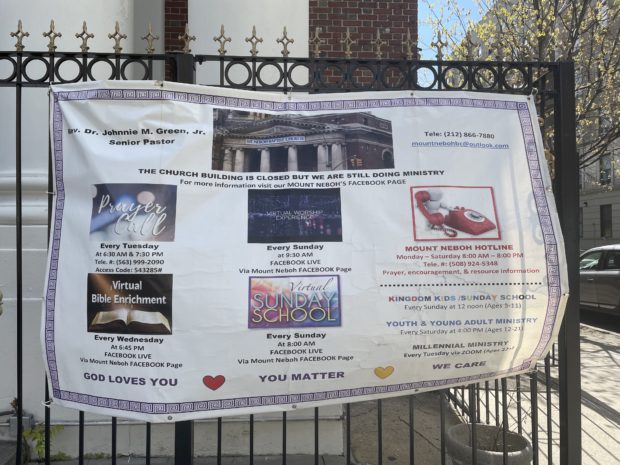
The first Sunday in March was the end of an era in the life of Mount Neboh Baptist Church in Harlem. It was the last Sunday that the church would hold virtual services, an accommodation it had offered since the beginning of the COVID-19 pandemic two years ago.
Since March 2020, the parish, at 1883 Adam Clayton Powell Boulevard, had only been open a few hours a day from Tuesdays to Fridays.
When I tuned in for the final virtual lessons at 8 a.m. on Sunday, I watched people pop into the Zoom and Facebook Live call one by one, smiling at each other and dropping familiar good morning messages in the chat.
But instead of celebrating the end of an era or speculating what it would be like to gather in person once again, the online conversation was all about justice.
“Does God pervert justice?” asked the Reverend Gerforne Johnson.
Blank stares from behind screens left Johnson bewildered.
“Did I go on mute?” she asked.
I didn’t know enough about God to answer her question. But as I learned later in the virtual Sunday service, even Christians aren’t meant to always know God’s will.
The Sunday school, part of the church’s Black History Month teaching series, would be about the misunderstanding of God’s justice, taught through the story of Bildad and Job from Job 2:11.
“Can someone highlight what is one of the biggest injustices we face as people of color?” asked Minister Maya Clarke for the adults of Bible Study group three’s icebreaker prompt.
Echoes of “voting rights” “job discrimination” and “racism” flooded the unmuted crowd of fifteen.
From overlapping voices emerged the answer Clarke was looking for: police brutality.
“Too many innocent women and men of color are being killed or assaulted at the hands of police officers,” she said. Her use of the present tense made me realize this lesson wouldn’t only be about biblical history. Black churches in America have been forced to reckon with external social and political injustices since their inception.
Before sympathy or condolences are offered to those killed by law enforcement, Clarke continues, the criminal past of Black victims is often used to purport an explanation for why they landed in the position they did. In other words, Black victims are blamed far more than White victims, as if their past transgressions justified their deaths.
“Do you ever find yourself victim-blaming?”
Nobody wanted to answer this one, perhaps afraid to show that they had ever acted in judgment.
“With all things, God’s justice is always fair despite what it might look like.”
Bildad was a Shuhite, from the nomadic tribe of southern Palestine. He had been placed by God in Job’s life after Job had lost his children because of their sins– a test of Job’s faith. Bildad told Job that all of the negative events in his life were a punishment for his sins, on the premise that the righteous would never suffer.
But Bildad was wrong, Johnson said. He assumed he knew what God was thinking.
“Do you blame God for things that you don’t understand?”
A woman piped up from the boxed congregation. “Yes, I blamed God when my Grandma passed, because I didn’t understand why He would do this to the only person I knew who lived exactly by His word.”
“Only God knows why bad things happen to good people,” replied Johnson. I wondered if the woman was satisfied with her answer.
Sister Shirley Monroe seemed as though she had been pondering a question during the entire Bible Study, and was itching to pose it to the group.
“I just wanted to know why people say it was God’s will if someone gets killed in the streets,” she said. “Was that really God doing that?”
A tonal shift among the crowd indicated that questioning God’s motives behind human suffering was a difficult and heavy topic to approach.
The senior pastor, the Rev. Dr. Johnnie M. Green Jr. spoke up from a moving vehicle to answer Monroe’s query.
“God doesn’t order a hit on somebody’s life,” he said. “But a person who dies from street violence may often be reaping the seeds they’ve sown.”
Wasn’t this victim-blaming? I was unsure how the pastor had understood the lesson in such a different way than I had, but he doubled down in his next statement.
“God allows certain things to happen and we have to accept it as the grand scheme of things. Sometimes people bring it on themselves.”
The pastor’s words felt like a sharp detour from today’s message. I looked at the faces of the churchgoers to see if anyone felt differently about the question, but they remained expressionless, maybe to say that the head pastor had the final call.
I wish I knew how God put His plans in action. I wish I knew why bad things happen to good people. Was everyone else truly okay with not knowing? ![]()
Violence on the streets of New York has continuously caused suffering in the Black community, and that suffering has led to a collective grief. But in that grief, for believers to accept their fate as players in God’s long game, is something that fascinates me about faith. Deep down, they must trust that everything happens for a reason they might never understand. I realized the theme of today’s lesson was about control– how Christians must grapple with the things out of their control, and how God’s omnipotent control is one of Christianity’s great mysteries.
